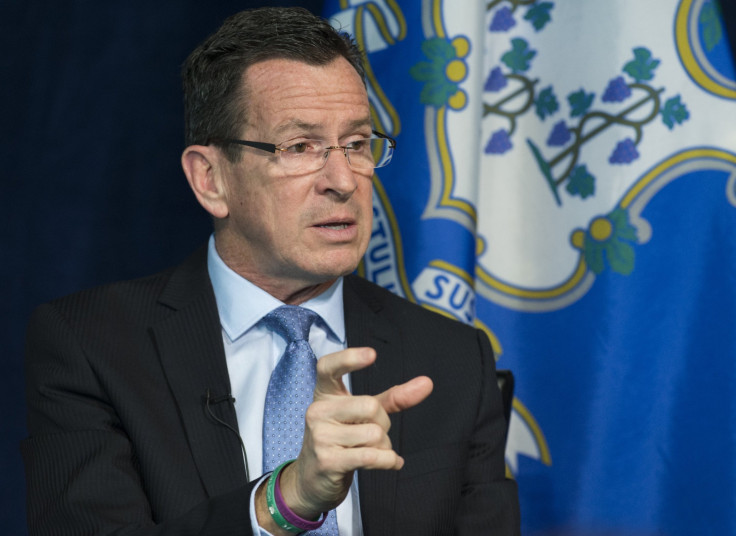Cigna-Anthem Deal: Gov. Malloy And Regulator Misled Public, Ethics Official Suggests

Connecticut Gov. Dan Malloy’s administration said it was suspending its review of a controversial healthcare merger after federal authorities sued to block it. But that has not halted a conflict-of-interest probe into Malloy’s top insurance regulator, Katharine Wade, over her role in the review of the Cigna-Anthem deal. Instead, state ethics officials voted Thursday to continue their investigation, with one suggesting that Malloy and Wade had misled the public when they tried to fend off calls for Wade to recuse herself.
At issue is Wade’s impartiality, given her personal, financial and familial ties to Cigna. Consumers groups — who say Anthem’s proposed acquisition of Cigna could raise premiums for 53 million people across the country — have argued that Wade cannot fulfill her regulatory role as her agency leads the national multistate review of the deal.
After an International Business Times investigative series reported on Wade’s connections to Cigna, Democratic and Republican lawmakers called for her to step aside. Malloy and Wade rejected the demands for recusal with a seemingly powerful argument: that state ethics officials had already blessed the arrangement, assuring the public that Malloy’s administration was in compliance with ethics laws.
But at a meeting Thursday of Connecticut's Citizen's Ethics Advisory Board, the agency’s general counsel, Barbara Housen, said that ethics officials never approved Wade leading the review of the merger. Instead, Housen said, the agency had concerns about the situation and provided Wade with a previous ruling that flagged a similar situation from 1996 — one in which ethics officials declared that an impermissible conflict-of-interest could be at play.
Malloy’s office declined to comment on Housen’s statements, and Wade’s office did not respond to IBT’s request for comment.
Earlier this week, Republican lawmakers said they had been “led to believe that Commissioner Wade had formally sought guidance from the Office of State Ethics regarding potential conflicts of interest” and were “surprised” to learn she never had. That surprise likely stems from previous public statements issued by Wade’s and Malloy’s offices as the state officials resisted mounting pressure to remove Wade.
“The commissioner has consistently sought the guidance of the Office of State Ethics and has made it clear that she will abide by whatever guidance ethics ultimately issues, even [if] that guidance changes from what has been previously conveyed,” Wade’s spokesperson told the Hartford Courant in mid June.
Similarly, Malloy’s office told IBT: “We have always said, consistently, that if the Ethics commission identified a problem, then we would undoubtedly follow their guidance. So far, that has not been the case. The Commissioner has previously and proactively sought that independent guidance, and what’s been made clear from their end is that everything is being handled appropriately.”
Housen challenged those assertions. In her Thursday testimony, she said that in September, Wade sent the office “a statement essentially stating that in her view she does not have a conflict of interest under the code of ethics.” That statement, said Housen, “was reviewed by the legal division, my division, and we had some concerns when we reviewed it, so my division reached out to Commissioner Wade.”
During a subsequent face-to-face meeting, Housen said, “We provided her with the [prior] opinion, we told her that all of the former Ethics Commission opinions are good law unless they are revoked or somehow overturned by this board. However, we recommended — this is my recollection — that she follow up with the legal division and make a request for advice in writing…[We] left the meeting absolutely believing that she would follow up with us in writing asking us for advice, and that she would be elaborating and setting forth the relevant facts which we didn’t have.”
Though Wade’s office and Malloy’s office have suggested the ethics commission gave guidance approving Wade’s involvement in the merger, Housen said Wade never followed up, and the board never issued such a guidance.
“We never got any follow up, there was never any request in writing,” she said. “Certainly we never issued an opinion that Commissioner Wade does not have a conflict of interest under the code of ethics with respect to this Anthem-Cigna merger.”
The questions surrounding Wade’s and Malloy’s public statements about ethics guidance are not the only declarations being scrutinized: Earlier this month, IBT’s investigative series revealed that in seeking approval for her husband to make a Cigna stock transaction in the middle of her agency’s review of the Cigna merger, Wade told ethics officials, “There are no Cigna matters before me.”
“This statement is legally irrelevant, factually incorrect and completely disingenuous,” said Senate Minority Leader Len Fasano and two of his Republican colleagues in a recent letter submitted to the ethics office.
As Housen delivered her testimony, federal law enforcement authorities in Washington announced their lawsuit to try to block the Cigna-Anthem merger on antitrust grounds. Wade’s office circulated a press release saying it is suspending its review of the merger because of the federal case. That move, however, did not derail the state ethics probe.
“We should proceed following the rules and regulations so that we are prepared in case the Department of Justice withdraws its suit and the Department of Insurance reinstates the review,” said ethics board chairman Charles F. Chiusano.
© Copyright IBTimes 2024. All rights reserved.






















